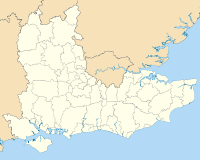New Forest District
50°52′44″N 1°37′59″W / 50.879°N 1.633°W
New Forest
New Forest District | |
|---|---|
| Motto: "Old yet ever new" | |
 New Forest shown within Hampshire | |
| Sovereign state | United Kingdom |
| Constituent country | England |
| Region | South East England |
| Non-metropolitan county | Hampshire |
| Status | Non-metropolitan district |
| Admin HQ | Lyndhurst |
| Incorporated | 1 April 1974 |
| Government | |
| • Type | Non-metropolitan district council |
| • Body | New Forest District Council |
| • Leadership | Leader and Cabinet (Conservative) |
| • MPs | Julian Lewis Desmond Swayne |
| Area | |
| • Total | 290.8 sq mi (753.2 km2) |
| • Rank | 43rd (of 296) |
| Population (2022) | |
| • Total | 175,942 |
| • Rank | 119th (of 296) |
| • Density | 610/sq mi (230/km2) |
| • Ethnicity | 94.9% White British 2.67% White Other 0.94% Asian 0.35% Black 1.14% Other |
| Time zone | UTC0 (GMT) |
| • Summer (DST) | UTC+1 (BST) |
| ONS code | 24UJ (ONS) E07000091 (GSS) |
| OS grid reference | SU2581608959 |
| Website | www |
New Forest is a local government district in Hampshire, England. Its council is based in Lyndhurst. The district covers most of the New Forest, from which it takes its name.
The district was created on 1 April 1974, under the Local Government Act 1972, by the merger of the municipal borough of Lymington with New Forest Rural District and part of Ringwood and Fordingbridge Rural District.
With its population estimated at 179,753 in mid-2018, New Forest is one of the most populated districts in England not to be a unitary authority. It was recommended by the Banham Commission to become one in 1995, but this was vetoed by the government of the day.
Politics
Elections to the council are held every four years, with all of the 60 seats on the council being elected at each election. From the 1999 election, the Conservatives have had a majority on the council, following a period of No overall control between 1991 and 1995, then Liberal Democrat control from 1995 to 1999.
Following the 2019 election, the make-up of the Council is as follows:
#0087DC #FAA61A #DCDCDC| Party | Councillors | |
| Conservative Party | 46 | |
| Liberal Democrats | 13 | |
| Independent | 1 | |
Parishes and settlements
- Ashurst and Colbury
- Beaulieu, Boldre, Bramshaw, Bransgore, Breamore, Brockenhurst, Burley
- Copythorne
- Damerham, Denny Lodge
- East Boldre, Ellingham Harbridge and Ibsley, Exbury and Lepe
- Fawley, Fordingbridge
- Godshill
- Hale, Hordle, Hyde, Hythe and Dibden
- Lymington, Lyndhurst
- Marchwood, Martin, Milford-on-Sea, Minstead
- Netley Marsh, New Milton
- Ringwood, Rockbourne
- Sandleheath, Sopley, Sway
- Totton and Eling
- Whitsbury, Woodgreen

